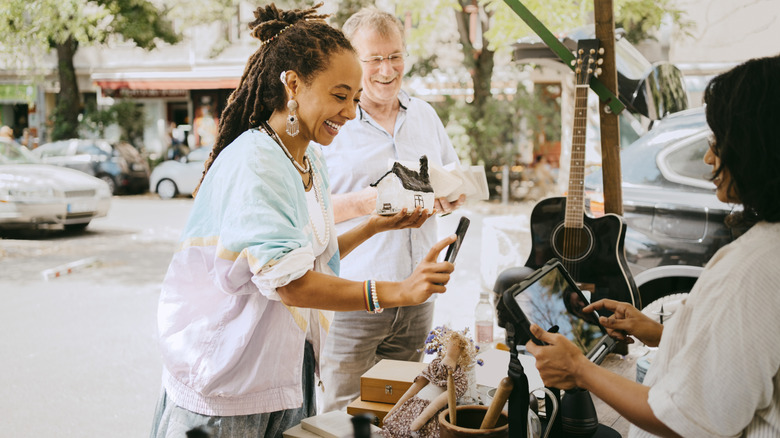This Faux Pas In America Is A Money-Saving Tool To Learn While Traveling Internationally
Part of traveling is learning about other cultures and experiencing customs that we normally wouldn't in our day-to-day lives. In fact, the best way to cure culture shock is to keep an open mind and be curious about the world, and that means trying out some new things. When it comes to shopping abroad, that could involve haggling. While it's considered a faux pas in America to ask for a lower price when shopping, in many parts of the world, it's expected in certain settings, like flea markets and outdoor stalls. While haggling over the price of food, which has a very small markup, isn't something you should do, and it likely won't go well if you try to change a price in a department store, bargaining at stalls and markets is a time-honored tradition. However, there are some rules and advice you should know before haggling in Europe and other destinations.
The first point is to understand that the marked or first price that you hear is intentionally higher than what a vendor may expect you to actually pay; if you're an American and the vendor assumes you're wealthy, it may be marked up even more. Next, you should do your research before you shop if you have a specific item in mind. Know what the going price is for locals, and have that as a starting point going in. If something seems overpriced and the seller isn't willing to negotiate, walk away and look elsewhere.
All about haggling for a better price when traveling internationally
One way to know if someone is willing to haggle is to pick an item, then say it's too expensive. If they offer you a different price, it's likely safe to haggle. Don't act as if you love the item or get too visibly excited — maintaining a poker face is all part of the game. Remember that this is a tradition, and it's done in good faith. Getting angry or upset isn't going to help you get a good deal. That also means that you shouldn't take anything personally.
If the price isn't right, be prepared to walk away. Whatever number is offered as you leave is likely the lowest price you'll get. However, you may still get a better deal if you offer to purchase more than one item from a vendor but say you don't have enough money to pay full price for both. You can also enlist the help of a companion to play "bad cop," who will say you have to leave, that it's not worth it, or that they saw the product for a better price elsewhere. However, keep in mind that some local artisans do make their living this way, and something handcrafted can be the most important souvenir you buy. Be respectful if they can't go any lower.
If your budget is low, shopping at the end of the day is a good idea, because you're adding to the bottom line at the last minute and may get a better price. Don't flash large bills, and know what you're willing to pay. Limit how much money is visible to the vendor, saying something like, "This is all I have." A good starting point is offering 50% of the asking price and letting them raise that a bit, though it may take some trial and error to settle on a fair price.

